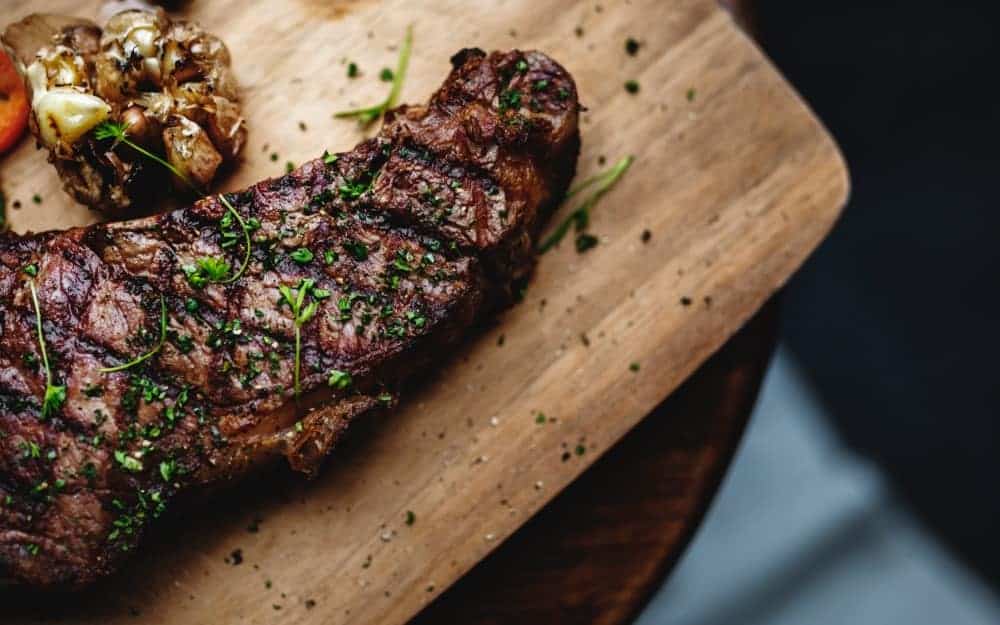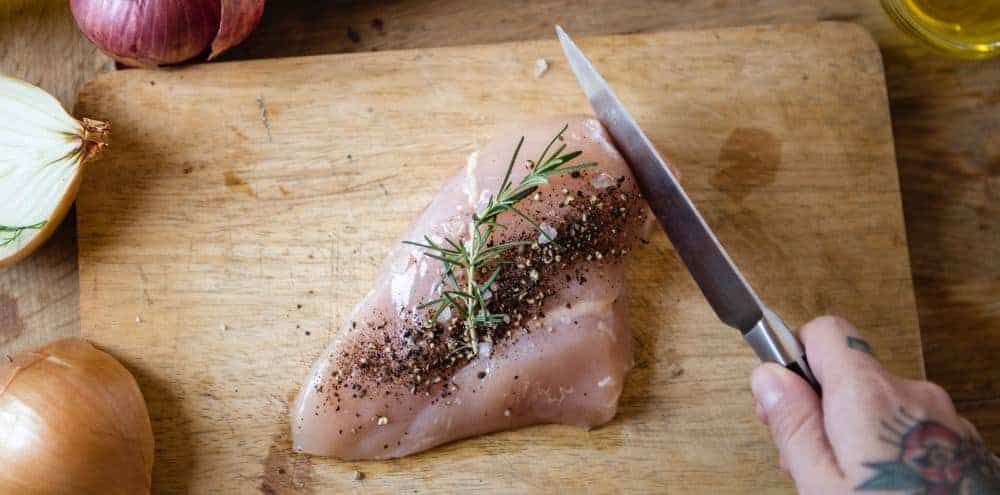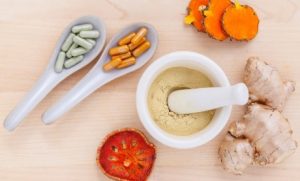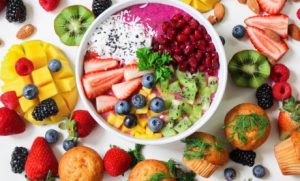Everyone talks about a healthy diet. You would like to know more about “micros”, “macros”, “carbs” & co? What should you eat and what to exclude from your nutrition? With this article, we will show you all you need to know about the basics of nutrition.
There are thousands of nutrition and training programs out there, but is it necessary to buy them? It can be useful, but not necessary, that’s for sure.
I do not believe in those programs. Why?
That is for a simple reason. Good nutrition and keeping your body in shape through weight training and sports are the fundamental keys to good health.

In addition, the whole concept is not very complicated at all which makes it even more important for everyone to deal with it themselves. If you understand the basics of nutrition and training once, you will be able to apply and adjust it to every situation in your life.
Thus, we are coming to a truly crucial aspect. All those programs do have a timeframe, but what happens after these 6 or 8 weeks? Exactly, you are at the same point where you have been before.
This one of the key reasons why I do not give much about these programs. Most of them are not even individually tailored because they can not predict your current life situation… And eventually, you are paying a lot of money for it!
So, guys, why would you spend your money on a temporary guide that does not tell you anything new which is not already somewhere accessible for free?
This brings us to my motivation to write this article. I do not want to see anyone of you spending more money on such programs.
A good and healthy life which is based on proper nutrition and physical workout, is not even nearly rocket science.
You should not make it more complicated than it actually is. Once you got the hang of it, you can adjust your training and diet according to your current situation. All in all, this benefits you life-long!
Therefore, in the following free guide, we will explain to you everything you need to know about the basics of nutrition.
First, let us consider our own body and the need to eat. Our body is constantly consuming energy – even while sleeping.
The amount of energy we would consume in 24 hours gives our basic metabolic rate (basal metabolism). This energy, measured in calories or joules, is needed to maintain the basic functions (eg. organs).
Through exercise, work and sport, this value increases with the workload. Consequently, the combination of both values represents our total need per day.
In other words, it can be said that a person gains weight when the energy supplied exceeds the total requirement. The opposite case results in weight loss.
The sources of energy in our diet are proteins, carbohydrates, fats, and alcohols. Protein and carbohydrates provide about 4.2 kilocalories per gram, while alcohol is 7 kcal and fat even 9 kcal.
Click here to calculate your calorie requirements!
In addition to this, our food still contains vitamins, fiber, minerals, and trace elements. These all play an important role in our basics of nutrition to maintain good general health.
If you want to build muscle, you need to consume a little more energy than your body consumes anyway. This means you should exceed your basal metabolism in order to grow. For more in-depth information on how to build muscle, what you should pay attention to and what to keep in mind, definitely check out our free guide!
Nevertheless just “more” is not the right way, I mean you do not want to gain endless pounds until you look like a bull, do you? Building muscle is a slow and tedious process. Patience and continuity is the magic formula.
Depending on the sport, the goal and the circumstances of your individual life as well as your body type, specific nutritional plans can show serious differences for your basics of nutrition. The ratio of carbohydrates, fats and proteins changes as well as the appropriate amount.
What does a healthy diet look like?
That cannot be answered at a flat rate. What is healthy in detail depends on many factors. Not least of all, how your metabolism works, if you have allergies, or simply what your body tolerates and what not.
Athletes should eat differently than couch potatoes, strength athletes than endurance athletes and so on.
Still, a few basics of nutrition apply to everyone, but the number of carbohydrates, proteins, fats or calories differs from each person individually. The common denominator: It is about giving your body what it needs. Only then it is possible to stay healthy and efficient in the long term.
And that is exactly what our mission is about, emerging athletes aim to always make the most out of it and live their life to the fullest.
So, why would you only want to improve your nutrition and current body conditions temporarily if you have all it takes to make the life-long change? This will benefit you with improvements in our four pillars, in all aspects of your life, not only fitness and nutrition but also spirituality and performance.
Referring back to the initial question, what is a healthy diet?
One thing in advance: That is something of everything. In order to deliver our best performance 100% every day, emerging athletes supply their body with all the required nutrients, train their body and mind on a regular basis.

Carbs, proteins, and fat – the basics of nutrition.
Carbohydrates, proteins, and fats provide calories and are the body’s main sources of energy, also called macronutrients. They are the foundation of your body’s basics of nutrition that it needs to maintain its metabolism.
How much you need of a particular macronutrient depends on your metabolism and your goal. With our macronutrient calculator, you can calculate which ratio is optimal for you.
I think we all know some of the common fitness myths: carbs after 6 pm makes you fat… or working out your abs proportional burns fat on your abs…
To be honest, that’s a lot of bullshit, but unfortunately, some people still believe in these…
Whether you lose weight or hold your weight (or even increase it) depends primarily on how many calories you consume relative to how many your body requires. Our calorie calculator will help you to determine your needs.
Basics of nutrition – Introduction
Just to pay attention to the ratio of macronutrients is not enough for a healthy way of living. You could cover your need for macros with chicken wings, fries, pizzas, and cakes.
But is that healthy? Unfortunately, not at all.
You probably heard about it, there is a relatively famous nutritional approach, called IIFYM (if it fits your macros).
What does that mean?
Basically, the key thought behind IIFYM is to supply around 80% of your diet with clean food and fill up the remaining 20% with whatever still fits into your macros.
Let me give you an example how a lot of people do it. After you’ve covered your daily protein and carb requirements, you still have some calories and fats left which you then could stock up with some ben&jerries, a burger or pizza.
This approach combines both ways and keeps a balance between good and healthy nutrition but still allows you to enjoy your life. We will cover IFFYM more in-depth in a separate article.
Carbohydrates – Whole grain instead of white flour
Carbohydrates (simplistic) are single and multiple sugars. The latter must first be split by the body and are therefore digested slower. Carbohydrates are the number one source of energy.
Your body can turn it into the energy you need faster than fats and proteins. They fill up longer and their contribution spreads over a longer period, while the former quickly enter the bloodstream and release their energy. Anyone who is hypoglycemic or does a lot of work in the near future can take advantage of this.
All wholegrain products should, therefore, be on the shopping list, while wheat products and sweets should be deleted for your basics of nutrition. Whole-grain products contain more complex sugars (carbohydrates), which are released into the blood more slowly and therefore saturate you over a longer period of time. Whole wheat flour also contains valuable ballast and micronutrients that are important for your general health.
Quite fundamentally complex and simple carbohydrates can be distinguished.
An example:
All bakery products that do not have “wholemeal” in their name are based mainly on extract flour. This flour contains nothing but pure energy in the form of simple sugars, nothing that your body really needs. This is colloquially referred to as simple carbohydrates.

Proteins – The muscle mass building nutrient
The name (from the Greek: priority / basic / first) suggests it already: Proteins are a fundamental part of your basics of nutrition. They are composed of different amino acids and form the basis of each cell.
In a nutshell, amino acids are the building blocks from which your body builds proteins. Therefore, our body does not need them just for muscle growth. Regular supply with sufficient protein is inevitable for our body.
Every food that contains protein contains different amino acids. It is, therefore, best to combine various protein-rich foods and also to integrate vegetable protein sources.
If you think of proteins, most you probably think of steak and lean quark – which is indeed correct, but it is not limited to such a small range of products.
Meat and dairy products indeed have a high protein concentration, but you do not necessarily need meat and cheese to supply your body with sufficient protein.
Vegetable foods also contain proteins. Legumes such as lentils, beans or (chickpeas) peas, soy foods, but also nuts, quinoa, avocado or peanut butter provide high-quality protein and other healthy micronutrients.
Furthermore, it is important to buy your products from responsible animal husbandry. Antibiotics and drug residues in chicken are just as unhealthy as highly processed sausages. Milk from pastured cows contains better fats than milk from cows that spend their lives in the stable.
To give you some ideas about what you can eat for a protein-rich diet, I’ve listed my favorites and most common ones below.

10 good protein sources!
- Chicken breast
- Tuna
- Wild salmon
- Cottage cheese (low fat)
- Eggs
- Soy / Tofu
- Beef (low fat)
- Legumes
- Buttermilk
- Low-fat quark
Fats – are fats essential to your diet?
Fats are differentiated into unsaturated and saturated fatty acids. Monounsaturated and polyunsaturated fatty acids support the absorption of fat-soluble vitamins, the development of cell membranes and take over other important health functions. They are included in, for instance, avocado, peanut butter, and olive oil.
Especially the polyunsaturated omega-3 fatty acids are essential for your health. They support the normal functioning of the heart, brain, and eyes. If you want to know more about omega-3 fats, check out the linked article!
Since the body can not produce omega-3 fatty acids by itself, it is necessary for your basics of nutrition to externally supply your body with them.
For example, ? through foods such as fatty sea fish, walnuts or linseed oil. Athletes, in particular, should eat enough omega-3. If you are vegetarian, vegetable omega-3 capsules are also a good alternative for you.
Saturated fats from baked goods, sausage or fried food should rarely land on your plate. The only exception among the saturated fatty acids: coconut oil. Its medium-chain fats (MTCs) serve as a source of energy for your body and are less likely to become fat deposits than other saturated fats.
Virgin oils, fish and nuts should be the preferred sources of fat. Avoid hardened vegetable fats (trans fats), which are mainly found in conventional finished products. Although fat has the highest calorie density, it is also very important for many metabolic processes.
Therefore, for your basics of nutrition, you should keep your body supplied with enough fats, but only the good ones!
If you want to know more about macronutrients, we have a separate free guide for you to check out!
Micronutrients – vitalize your body
Imagine a house: The macronutrients form the foundation and shell of the house. To keep the house standing for a long time and to be cozy, it needs insulation, electricity, plaster and so on – the micronutrients.
Calcium, iron, vitamins, and Co are micronutrients. They are contained in most organic and natural foods and play an important role in your basics of nutrition. They are essential to keep your body healthy, fit and efficient. Micronutrients are divided into vitamins, trace elements, and minerals.
Vitamins – maintain a balanced and healthy diet
Vitamins perform various functions in our body, such as supporting the immune system. If you eat 3-5 servings of fruits and vegetables daily, you should be well supplied with vitamins. As a rule of thumb, 800 grams of fruits and vegetables per day tend to be enough for most individuals.
This is often underestimated, but as part of your basics of nutrition, in the long run, your body needs them and gains a lot of benefits through adequate supply with vitamins. For instance prevention of diseases, to mention only one of its benefits.
Since vitamins A, D, E and K are liposoluble, it makes sense to add a tablespoon of chia seeds or a dash of linseed oil to a smoothie. So you assure to absorb all the vitamins.
Minerals and trace elements – The right macros for the basics of nutrition
Calcium and magnesium are perhaps the most popular minerals. However, there are many more that have vital functions in the body. For example, iron is essential for the formation of red blood cells.
The best-known trace elements for your basics of nutrition include iron, zinc, and iodine. They need to be ingested through your diet to keep you fit and healthy. Athletes often have an increased need for nutrients and should pay particular attention to a balanced diet to keep their body supplied with all essential macro- and micronutrients.
Here again, the “good” macros come into play: whole grain products often supply iron, magnesium, and zinc.
Zinc is found in cheese, but also in pumpkin seeds and sesame seeds. The latter two are easy to sprinkle over any food and have a significant iron content in addition to zinc.
Moreover, iron is found in meat and many plant foods such as amaranth, millet, and oatmeal. Likewise, mineral waters often supply important micronutrients.
That sounds more complicated than it actually is. If you know your ideal macronutrient distribution, put emphasis on the “good” macros and regularly eat fresh fruit and vegetables, little can go wrong.
Important: Only the whole fruit, not the juice, contains all valuable micronutrients. Orange juice is therefore not a full substitute for an orange.
Stay hydrated!
Not only food is relevant as part of the basics of nutrition, but sufficient liquid supply through beverages is also indispensable. Try to make water and tea your standard drink. The advantage is obvious: 1 liter of water brings it up and write 0 calories.
Compare this with coke or orange juice. For intense exercise or increased calorie requirements, I recommend adding water or fruit juice spritzers in ratio 1:1. Avoid sodas and other sweetened drinks!
Coffee is best served black. However, the performance-enhancing effect of caffeine can only be used by those who have not become resistant to excessive consumption.
You should abstain from alcohol as much as possible. On the one hand, it contains a lot of calories which you could rather fill with a proper meal. On the other hand, alcohol consumption inhibits your growth hormone secretion, your protein biosynthesis, and fat burning process.
5 simple tips for everyday life
1. Forget about diets!
A diet is always time-bound. In the best case scenario, this means you are doing something right for a few weeks in your diet, only to make it wrong afterward. Jojo effect and frustration are bound to occur. Instead, always focus on a long-term diet change. In the long run, that means you have to feel comfortable with it. And who feels good when he starves or only eats cabbage?
However, not everything about a diet is “bad”, but you can easily avoid diets and stay in shape the whole year if you have a properly balanced nutrition plan.
Anyways, if you conduct a diet, you should choose your food properly. We will discuss this topic more in depth in a separate article (coming soon).
2. Take your food to work/university.
This way, you avoid getting tempted to buy fast food, finished products or sweets in the short breaks. You also save money and are forced to think more about your diet if you plan your days in advance.
3. Place more emphasis on fruits and vegetables.
Frozen fruits and vegetables are particularly good at conserving valuable vitamins and fiber. These are often lost during prolonged transport in containers with supposedly fresh products. Thus, shock-frozen in the off-season is a very good alternative, as long as the domestic market is in hibernation.
4. Drink more water and tea instead of juice and sodas.
So you can save several hundred calories a day with at least 2 up to 4 liters a day. Also, try to keep your alcohol intake to a minimum. The old wisdom that 1 glass of wine a day keeps the heart healthy, is unfortunately outdated. Simple grape juice or fresh grapes achieve the same positive effect on the vessels, without the negative effects of alcohol.
5. Take your time and eat consciously.
Prepare your food as often as possible. So you not only know what’s in your food but besides you learn to prepare healthy alternatives that taste better and better than the finished product after a little practice.
Conclusion
- Calculate the optimal macronutrient distribution for you and your target goal
- Eat the “good” macros – they are full of essential micronutrients
- Eat fresh vegetables and fruits 3-5 times a day (rule of thumb: 800 grams of fruits and vegetables per day)
- Eat as many fresh foods as possible
- Athletes who have an increased need can use micronutrients, such as Omega-3, zinc, and magnesium, plus vitamins supplementation can be considered
- If you live vegetarian or vegan, learn about plant foods that contain iron, calcium, and zinc. Furthermore, you should keep an eye on your vitamin B12 supply since it is mainly contained in animal products. Consequently, for vegetarian or vegan living people it is more difficult to provide your body with a sufficient amount. Therefore it is advisable to supplement vitamin B12 separately.
If you have any further questions, please feel free to contact us. You can reach us through our social media channels or just leave a comment below!
What does your diet look like? What are your basics of nutrition?
Cheers,
Claas





2 thoughts on “Basics of Nutrition – Complete Guide”
I was checking your website and see you have a good design and it looks great, but it’s not ranking on Google and other major search engines.
Hi Elmira, Thanks for your kind feedback! Any suggestions on how to rank better? 😛
Cheers!